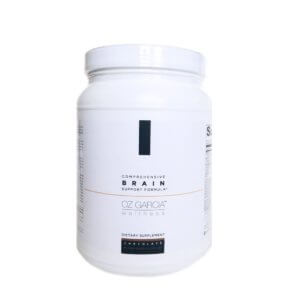If you are looking for a way to improve the nutrients you get to help with better brain health, keep on reading. Proper nutrition and supplementation play a large role in the health of our brain. Combining specific nutrients can increase our mental functioning, sharpness and memory. Organic fruits like blueberries, blackberries and strawberries along with vegetables, such as broccoli, spinach and tomatoes can help with overall brain function and memory in addition to the omega 3 oils found in fatty fish. Even a cup of green tea contains antioxidants that help with memory, and can be used in the treatment of cognitive disorders such as dementia. Protein (preferably organic) found in meat, eggs, beans and legumes, contain high levels of amino acids which produce neurotransmitters associated with better mental function as alertness.
Nutrients for Better Brain Health
In addition to diet, there are a number of nutrients that which can be taken in supplement form that support mitochondrial energy production, antioxidant systems, neurotransmitter production, and cell membrane integrity.
1. Vitamin E Tocotrienols
Tocotrienols can help to protect the brain by against inflammation. Having abnormal white matter lesions can affect stroke risk and a major benefit of tocotrienols is that they may support white matter health. Additionally, higher levels of tocotrienols in the blood plasma can be associated with a lower risk of mild cognitive impairment and a decreased incidence of Alzheimer’s disease.
2. N-Acetyl-Cysteine (NAC)
NAC is a precursor to glutathione—a tripeptide active in detoxification and antioxidant systems. Research suggests that NAC hinders the formation of free radicals that can contribute to oxidative stress in the brain.
3. Phosphatidylserine (PS)
PS is a phospholipid that is highly concentrated in the brain and plays a key role in neuronal energy production and communication. The body must synthesize the PS it needs for brain health because very little is found in food. Supplementation can help maintain normal brain levels of PS and thereby support brain functions that are dependent on this vital phospholipid. For some individuals, changes in brain function may be related to “age-related decline in nutrition”, and early nutrition intervention may be warranted.
4. Acetyl-L-Carnitine (ALCAR)
ALCAR supports nerve health. It is able to cross the blood-brain barrier where it stabilizes cell membranes, provides antioxidant support, and helps maintain brain cell health. In addition, ALCAR supports neuronal energy production, facilitates transport of fuel and waste products into and out of mitochondria, and supports production of acetylcholine, a neurotransmitter essential to the processes of learning and concentration.
5. Alpha-Lipoic Acid
This acid has fat- and water-soluble properties and therefore imparts intracellular and extracellular protection against oxidative stress. With its low molecular weight, alpha-lipoic acid is easily absorbed in the gastrointestinal tract. It then enters circulation, crosses the blood-brain barrier, and reaches the brain where it can support antioxidant activity and regenerate glutathione, vitamin E, and vitamin C.
6. Coenzyme Q10 (CoQ10)
CoQ10 plays a pivotal role in energy generation because it transports electrons in the mitochondrial electron transport chain. CoQ10 also donates electrons, helping to protect the brain from oxidative stress and further supporting neuronal cell health.
With these nutrients for better brain health in mind, I’ve designed a protein shake called BRAIN which makes a delicious breakfast or meal replacement.
Want to Learn more about BRAIN?

BRAIN offers the following cognitive health benefits:
- Supports Brain Health and Healthy Recall Ability
- Provides Nutrients That Support Antioxidant Mechanisms
- Supplies Protein and Amino Acids for Neurotransmitter Production


